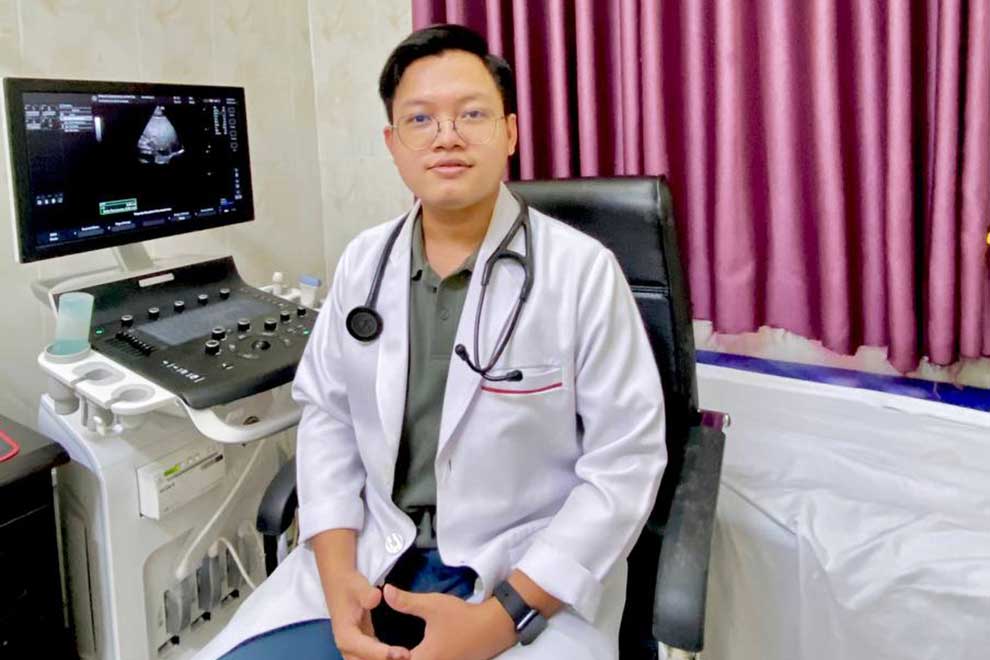
Dr Chan Panha Sokha, cardiologist at Preah Ang Duong Hospital. SUPPLIED
People with high blood pressure, diabetics, smokers and those who are overweight are more susceptible to heart disease and are advised to consult doctors early should they experience its most common symptoms such as palpitations, chest pains or a tightening feeling in the chest, according to cardiac specialists.
Although no formal statistics of the deaths or illnesses caused by heart disease are currently available, the last few weeks have seen increased publicity and social media posts around the disease as a slew of high-profile heart attack deaths stunned the nation. Among the dead were prominent Phnom Penh Crown Football Club president Rithy Samnang and artist Kong Monika.
As heart attacks can claim lives in the blink of an eye, some social media users even likened them to road accidents.
Dr Huot Vuthy, a cardiologist at the Khmer-Soviet Friendship Hospital in Phnom Penh, said people with high blood pressure, diabetics, smokers, those who are overweight and people aged 65 and older are more likely to develop heart attacks.
“Heart attacks are caused by blocked arteries that cut off blood supply to the heart. My hospital has no exact figures on how many people are living with heart disease, but we perform 20 to 30 endoscopies per month. This is used to examine the condition of their blood vessels,” he said.
Cardiologist Chan Panha Sokha at Preah Ang Duong Hospital in the capital told The Post that in general, heart attacks happen to the elderly and are rare among people under the age of 35. If a younger person suffers a heart attack, it is usually due to an irregular heartbeat, or an abnormal quantity of sodium, potassium or calcium in the heart cell.
He added that when a heart attack happens, it blocks the flow of blood. Heart attacks can also be caused by hereditary and non-hereditary defects.
“I have yet to see total data on the number of heart attack patients who have been admitted to Preah Ang Duong Hospital. Of 100 patients who come to see me, perhaps two or three will have irregular heartbeats. The technical term we use is Brugada syndrome, and it can end lives. It causes the heart to beat too quickly, which can lead to blockages,” he said.
He added that Brugada syndrome sufferers often experience dizziness, their hearts pound off-beat and sometimes their arms and legs contract due to the heart malfunctioning.
He advised that patients can have health-checks at the hospital and continue with healthy follow-up treatments at home. If they have palpitations or chest pains which go away when they use caffeine, it is a symptom of heart disease.
“When you visit a doctor, he should examine your heartbeat. There are usually minor symptoms which a doctor can use to predict the early stages of heart disease. Sometimes, a doctor can miss these indicators, however,” said Dr Panha Sokha.
“Patients should consult with a cardiologist, especially those who have the contributing conditions, such as diabetes, or those with a family history of heart disease,” echoed Dr Vuthy.
Dr Panha Sokha said fatty foods, fried foods, caffeine or energy drinks and salty foods affect the heart, elevating blood pressure and causing other problems.
Dr Vuthy said the condition is treatable, often with medication. In more serious cases, surgeons can widen blood vessels through surgery.
“We have to control contributing factors. Diabetic patients should be receiving regular treatment from a doctor. If a person has high blood pressure, they must take the pills prescribed to them by their cardiologist or family doctor. They have to quit smoking,” he said, adding that people who are obese should make an effort to lose weight by exercising and eating well.
Dr Panha Sokha said: “We advise patients to exercise for at least 30 minutes a day, and refrain from snacks, especially fatty and salty foods.”











